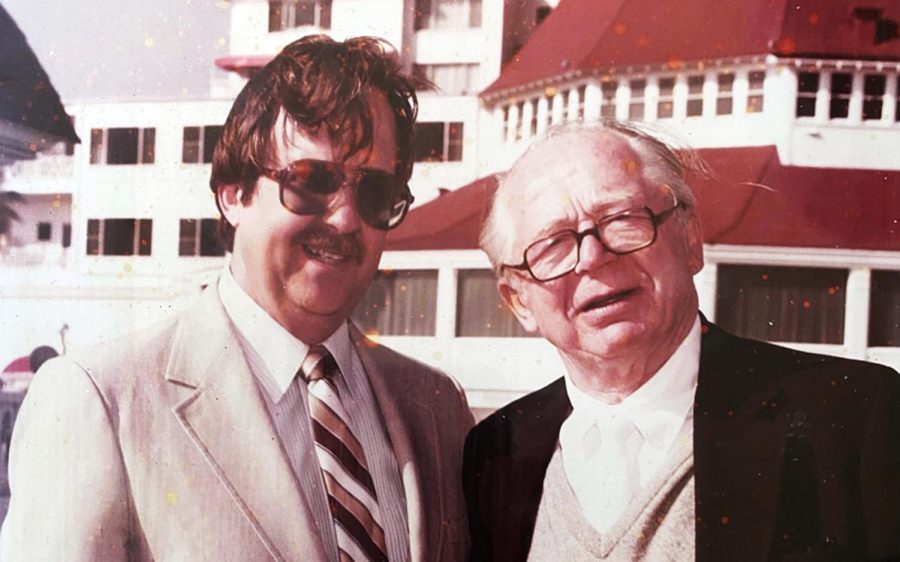Notes and Quotes: My breakfast with a film legend
Columnist Tom Morrow stands with noted director Billy Wilder at the Hotel del Coronado in San Diego. (Photo courtesy of Tom Morrow)
April 28, 2022
I would imagine everyone at one time another has visions or dreams of having a conversational meal with someone considered great or a genius. Churchill, Eisenhower, or even Einstein – someone like that. My chance came in 1984. I had an invitation to have breakfast with one of the world’s great film makers. — Billy Wilder
I was an executive at the famed Hotel del Coronado and had just staged a 25th anniversary celebration of director Billy Wilder’s legendary film “Some Like It Hot,” starring Jack Lemmon, Tony Curtis, and Marilyn Monroe. I invited everyone for a fabulous weekend of fun. Lemmon, Curtis and Wilder showed up, along with many of the supporting cast still living. It was a flawless weekend that went off exactly as I had planned it.
 Wilder’s film accomplishments are rivaled by no one. His list of screenplays since 1929 included Greta Garbo’s “Ninotchica,” “Hold Back the Dawn,” “Champagne Waltz,” and dozens more. As a writer-director, he won Academy Awards and other awards for “Sunset Boulevard,” “Stalag 17,” “The Lost Weekend,” “Double Indemnity,” “The Apartment,” “The Seven Year Itch,” “Witness for the Prosecution,” “The Spirit of St. Louis,” “Sabrina,” “The Front Page,” plus “Some Like it Hot,” to name a few.
Wilder’s film accomplishments are rivaled by no one. His list of screenplays since 1929 included Greta Garbo’s “Ninotchica,” “Hold Back the Dawn,” “Champagne Waltz,” and dozens more. As a writer-director, he won Academy Awards and other awards for “Sunset Boulevard,” “Stalag 17,” “The Lost Weekend,” “Double Indemnity,” “The Apartment,” “The Seven Year Itch,” “Witness for the Prosecution,” “The Spirit of St. Louis,” “Sabrina,” “The Front Page,” plus “Some Like it Hot,” to name a few.
On the Sunday morning after an evening of celebration, I received word that Mr. Wilder wanted to have breakfast with me. I had a brief phone conversation with Lemmon, asking if the invitation was real or simply a polite gesture by Wilder.
“My boy, never pass up a chance to sit at the feet of greatness,” was Lemmon’s response.
We met out on the Promenade deck on a bright Sunday morning. Wilder was sitting at a table sipping a cup of coffee and smoking a cigar. I had placed a box of expensive cigars in his suite upon his arrival on Friday evening. That morning, I arrived at the same time as Lemmon, who Wilder also had invited.
We had breakfast while Lemmon and I sat listening to Wilder talking on a number of subjects, including being back at the hotel after 25 years. He recalled how difficult Marilyn had been to work with him, Lemmon and Curtis. About how she held up the filming while her two co-stars stood patiently by, in high-heels and drag waiting for their next scene with her. The film has since been heralded the greatest comedy put on film.
He talked about art, which he was one of the world’s great experts. Earlier, Lemmon had told me of a night many years earlier when he accompanied Wilder to a private showing at a Beverly Hills art gallery:
“Billy told me to buy a particular painting. I didn’t like it, but he said it would be a good investment, so, I bought it, paying $1,000. I stuck it in a closet when I got home and forgot it. Some years later, the gallery owner called me, asking if I would consider selling it. I smelled a profit. Painfully telling the gallery owner how hard I would find in parting with the painting, he offered me $10,000. I continued to lament the thought of parting it with, but told him I would do so.”
Lemmon shook his head. “Now how in the hell did Billy know that painting would be such a good investment?” Lemmon reckoned it was pure genius.
The man who escaped the Nazis in 1933, coming to America knowing less than 100 words of English, indeed was truly a genius of canvas and film.
The money raised during that Saturday night banquet in the hotel’s ballroom went to San Diego State University’s new film editing facility. Years later, I received a call from a university official to ask if I would get in touch with Wilder, inviting him to come to the editing facility’s opening. I still had his home phone number. After dialing the number, a heavy German accent answered. When I identified myself, asking if he remembered me, the reply was: “Of course, Tom. Say, do you have any more of those great cigars?” He might not have remembered my face, but he remembered my taste in good cigars.
Billy Wilder died of pneumonia on March 27, 2002, at the age of 95. Taking his sense of humor to the grave, the epitaph on his tombstone is the final line from “Some Like It Hot.” The stone is engraved: “Billy Wilder, I’m a writer, but then nobody’s perfect.”
He was the nearest thing to perfection.
Tom Morrow is a longtime Oceanside-based journalist and author who contributes to OsideNews.
Columns represent the views of the individual writer and do not necessarily reflect those of the North Coast Current’s ownership or management.





